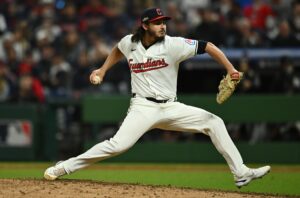All this record-breaking business gets one’s gears turning. When Aaron Judge hit his 62nd home run on October 4th, 2022, he broke Roger Maris’ American League single-season home run record of 61 set in 1961. We’re all pretty much caught up on that, right? Good, so let’s go back a bit, then forward, then way back shall we?
McGwire, Sosa, McGwire, Bonds
In 1998, Mark McGwire and Sammy Sosa played a game of leapfrog after McGwire broke Maris’ then Major League record of 61 home runs. McGwire hit his 62nd home run on September 8th, 1998. Over the next 16 days, McGwire hit three more home runs for a total of 65. Then McGwire’s playmate, Sosa, took the leap over McGwire when he hit his 66th home run on September 25th. McGwire hit his 66th that same day and ended Sosa’s 43-minute reign. The following day McGwire hit his 67th and Sosa decided to stop playing leapfrog. McGwire closed the season with 70.
McGwire was the single-season home run king for three years. Then Barry Bonds. You know the number. 73 in 2001. Now, nearly 22 years later, his record still stands.
Of Course, Babe Ruth
So we went back a bit, then forward, and now we are going to begin our journey way back. We’ll start on October 1st, 1961. That is the day that Maris hit his 61st home run and broke Babe Ruth’s seemingly unbreakable record. Previous to Maris breaking Ruth’s record, the mark of 60 stood as the single-season record for 34 years. When Ruth hit 60 home runs in 1927 he broke the single-season record of 59 set by none other than himself in 1921. The previous record was 54 set in 1920 by, you guessed it, the Great Bambino. And before the lofty mark of 54, the record was 29. Which was set by a Boston Red Sox pitcher who was about to light the baseball world on fire. His name, was, of course, Babe Ruth.
Who?
Ruth broke the single-season home run record four times. That’s right, four. He broke his own record three times, but who was the record holder other than Ruth? And why, unless you have John Thorn’s encyclopedic baseball knowledge, do we not know his name like we do that of Ruth, Maris, Bonds, or Judge? Who was the single-season home run king before Ruth? Any guesses? John put your hand down, that’s not fair. Nothing? It was none other than the fabulous Edward Nagle Williamson, more commonly known as Ned.
Ned Williamson
Can’t believe you didn’t know the answer? Don’t worry about it, your lack of knowledge about old Ned puts you in the majority of baseball nuts. Williamson played ball back when the home team set the ground rules for the game and hitting a ball over the fence didn’t necessarily mean a home run. In fact, prior to 1884, a ball hit over the fence was a double. Lucky for Ned he played for the Chicago White Stockings. At the time the White Stockings played at Lakeshore Park. Lakeshore had short dimensions, meaning that the home run fence was very close to home plate. Player/Manager and team captain of the White Stockings, Cap Anson, saw an opportunity to get a leg up and declared that a ball hit over the fence was a home run.
Williamson used this new rule to his advantage and, although he was known mostly as a great fielder during his career, he became the predecessor to the Sultan of Swat by smashing 27 home runs. Of those 27, 25 were hit at Lakeshore Park. Proof that had Ned, or should we call him Lucky Ned, played elsewhere he might not have been included in the cast of home run kings. A final note on Williamson. Following his record-setting 1884 season, the White Stockings moved from Lakeshore to West Side Park. West Side had much larger dimensions and Williamson’s home run total dropped to three for the 1885 season. Even more proof that Ned was quite fortunate to have played at Lakeshore Park.
Harry Stovey
Prior to Lucky Ned, a gentleman named Harry Stovey sat atop the single-season home run leaderboard. His reign was short, amounting to only 1 year.
Gentleman Harry, as he was known because of his clean style of play, was one of the best baseball players of the 19th Century. Stovey could hit for power and had great speed on the basepaths. Although he is altogether forgotten and unlike many of the other stars of the 19th Century, Stovey has failed to be elected to the Hall of Fame. And while Stovey had many great seasons of professional baseball perhaps the greatest time in his career was when he was with the Philadelphia Athletics of the American Association. It was in his first season with the Athletics, 1883, that Stovey hit 14 home runs and captured the single-season home run record. And while he only held the title for one season, Stovey would go on to be the first player to hit 100 home runs in Major League Baseball history, ending his career with 122.
Charley Jones
On August 1, 1883, Gentleman Harry hit his tenth home run of the season and passed the previous single-season leader, Charley “Knight of the Limitless Linen” Jones. Jones, who came upon this uncommon nickname by opening a laundromat after being blacklisted by the National League over a salary dispute, was possibly the first true home run hitter in Major League history. He was also known to be difficult and spent his 12 Major League seasons with eight different teams. Jones held the title for four years before Stovey knocked him off the pedestal. While Jones may have been difficult, he surely had one of the more enviable mustaches the game has ever seen.
George Hall
All roads eventually lead to George Hall, the grandaddy of single-season home run record holders. The year was 1876 and the newly formed National League, the first official Major League, was in its inaugural season. Hall played for the Philadelphia Athletics and was an offensive standout on the team. He led the Athletics in batting average, runs scored, and most importantly when it comes to this article, home runs. Matter of fact he not only led the Athletics in home runs but the entire National League.
Hall walloped five home runs, which was good enough to capture and hold the single-season home run record for the next three years, making him the first official single-season home run record holder in MLB history. Unfortunately, greed got the better of Hall and he was banned from professional baseball for life because of his participation in the 1877 Louisville Grays scandal. Hall, along with three other players, admitted to throwing games in exchange for $100 per game.
Main Photo:
Players Mentioned:
Aaron Judge, Roger Maris, Mark McGwire, Sammy Sosa, Barry Bonds, Babe Ruth, Edward Nagle Williamson, Harry Stovey, Charley Jones, George Hall, Cap Anson






